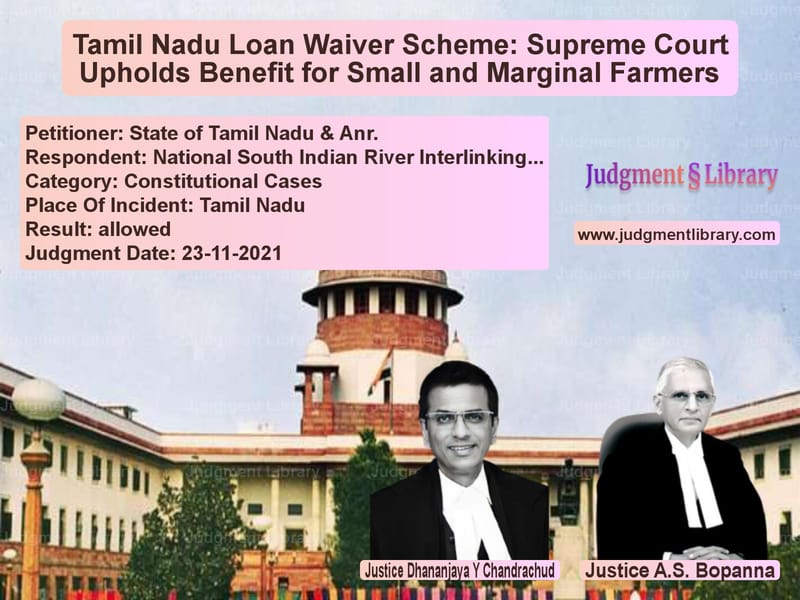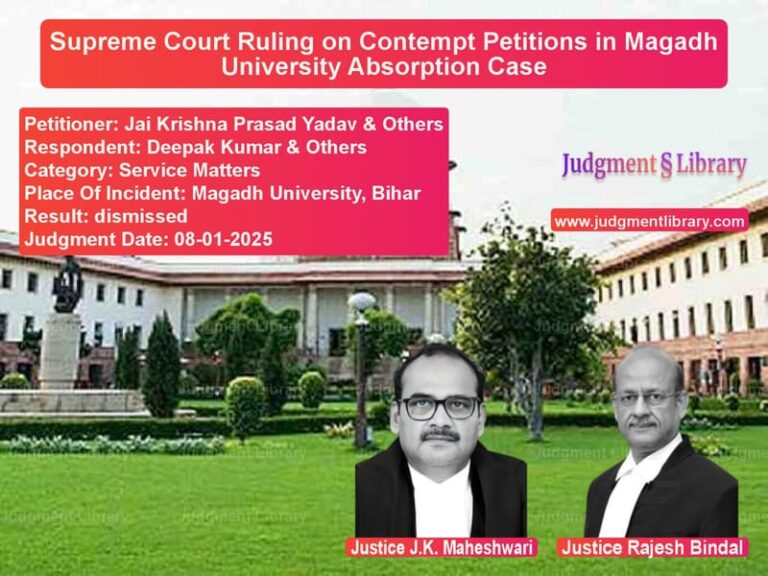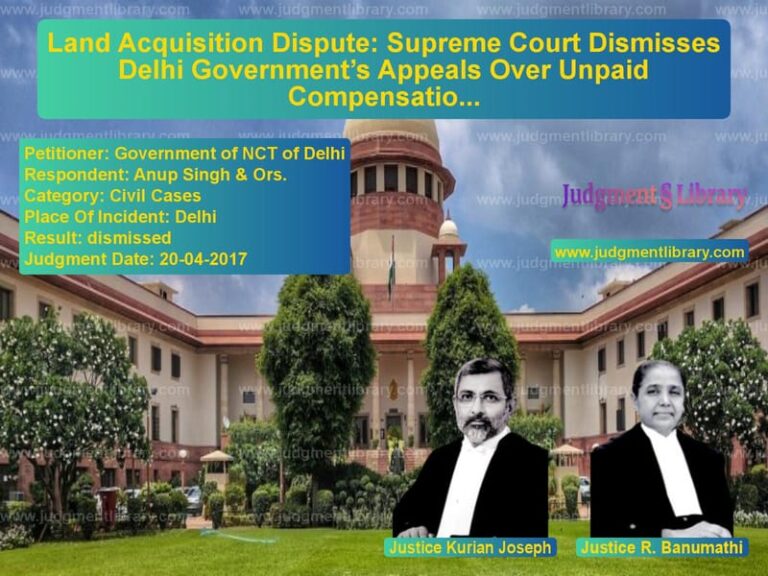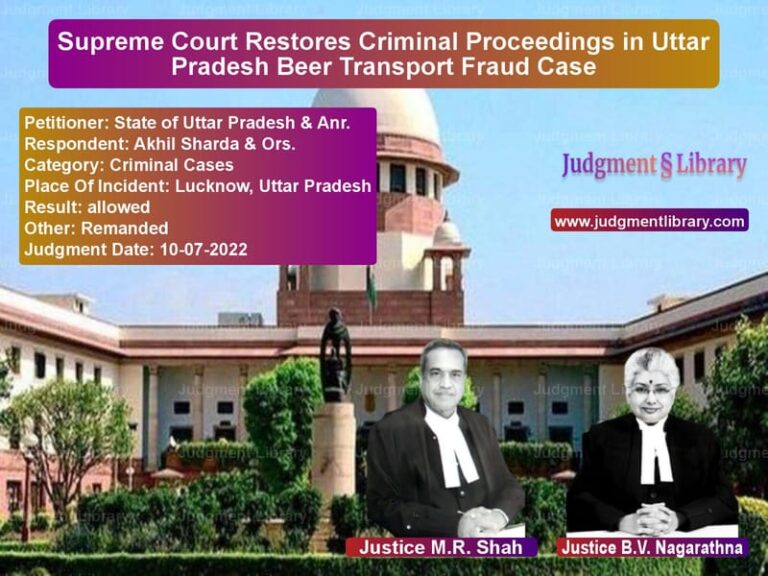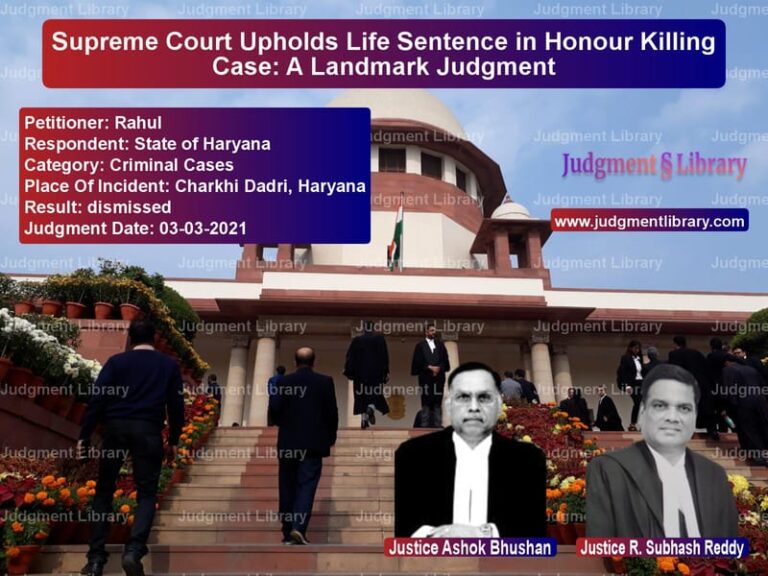Tamil Nadu Loan Waiver Scheme: Supreme Court Upholds Benefit for Small and Marginal Farmers
The case of State of Tamil Nadu & Anr. vs. National South Indian River Interlinking Agriculturist Association revolves around the Tamil Nadu government’s policy decision to grant a loan waiver to small and marginal farmers. The Supreme Court was tasked with determining whether limiting the waiver only to small and marginal farmers violated Article 14 of the Constitution.
Background of the Case
On 13th May 2016, the Tamil Nadu government issued Government Order (G.O.) Ms. No. 50, introducing a scheme to waive outstanding crop loans, medium-term agricultural loans, and long-term farm sector loans availed by small and marginal farmers. Subsequently, G.O. Ms. No. 59, dated 28th June 2016, provided guidelines for implementing the scheme. The classification of farmers was based on landholding records:
- A marginal farmer was defined as one holding up to 2.5 acres of land.
- A small farmer was defined as one holding between 2.5 to 5 acres of land.
The scheme excluded farmers with landholdings exceeding 5 acres, which led to legal challenges.
High Court Ruling
The respondent, National South Indian River Interlinking Agriculturist Association, filed a writ petition in the Madras High Court at Madurai, challenging the scheme’s exclusion of larger landholding farmers. The High Court ruled in favor of the association, holding that:
- The exclusion of farmers with landholdings over 5 acres was discriminatory and violated Article 14.
- There was no rational justification for granting the waiver to only small and marginal farmers.
- The government should extend the waiver to all farmers, regardless of landholding size.
The Tamil Nadu government appealed to the Supreme Court.
Arguments by the Appellant (State of Tamil Nadu)
- The government’s policy decision was based on financial constraints and aimed at assisting the most vulnerable farmers.
- Small and marginal farmers are more affected by climate change, limited access to credit, and market fluctuations.
- Extending the waiver to all farmers would impose an unsustainable financial burden on the state.
- The classification was based on an intelligible differentia and had a rational nexus with the scheme’s objective.
Arguments by the Respondent (National South Indian River Interlinking Agriculturist Association)
- Farmers holding more than 5 acres contribute more to GDP and food security.
- Excluding them from the waiver was arbitrary and unfair.
- The state failed to prove that small and marginal farmers suffered greater losses than large landholding farmers.
Supreme Court’s Observations
The Supreme Court bench, comprising Dr. Dhananjaya Y Chandrachud and A.S. Bopanna, analyzed the scope of judicial review in economic policies and whether the classification violated Article 14.
The Court reiterated that while policy decisions of the government are generally not subject to judicial review, they must pass the test of reasonableness under Article 14. It observed:
“A policy decision is subject to judicial review on the limited grounds of compliance with fundamental rights and other constitutional provisions.”
Key Findings
- Economic policies must be examined with greater deference by courts, but they cannot be arbitrary.
- Small and marginal farmers face greater financial distress due to lower access to technology, credit, and irrigation.
- The classification of farmers based on landholding size was reasonable and had a rational nexus with the scheme’s objective.
- The government’s fiscal capacity must be considered in determining the extent of benefits.
Final Judgment
The Supreme Court ruled that:
- The loan waiver scheme was constitutional.
- The exclusion of large landholding farmers did not violate Article 14.
- The High Court’s order directing the government to extend the waiver to all farmers was set aside.
Impact of the Judgment
This ruling has significant implications for government welfare schemes:
- Judicial Review of Economic Policies: Courts will not interfere with fiscal policies unless they are manifestly arbitrary.
- Targeted Subsidies and Benefits: The judgment affirms that governments can classify beneficiaries based on need.
- State’s Discretion in Welfare Measures: The ruling upholds the government’s discretion in designing welfare schemes within constitutional limits.
Conclusion
The Supreme Court’s decision in State of Tamil Nadu vs. National South Indian River Interlinking Agriculturist Association reinforces the principle that economic policies must be examined within the framework of reasonableness and equity. By upholding the classification of small and marginal farmers as the primary beneficiaries, the ruling ensures that government welfare schemes remain financially viable while serving the most vulnerable sections of society.
Petitioner Name: State of Tamil Nadu & Anr..Respondent Name: National South Indian River Interlinking Agriculturist Association.Judgment By: Justice Dhananjaya Y Chandrachud, Justice A.S. Bopanna.Place Of Incident: Tamil Nadu.Judgment Date: 23-11-2021.
Don’t miss out on the full details! Download the complete judgment in PDF format below and gain valuable insights instantly!
Download Judgment: state-of-tamil-nadu-vs-national-south-india-supreme-court-of-india-judgment-dated-23-11-2021.pdf
Directly Download Judgment: Directly download this Judgment
See all petitions in Fundamental Rights
See all petitions in Public Interest Litigation
See all petitions in Legislative Powers
See all petitions in Judgment by Dhananjaya Y Chandrachud
See all petitions in Judgment by A. S. Bopanna
See all petitions in allowed
See all petitions in supreme court of India judgments November 2021
See all petitions in 2021 judgments
See all posts in Constitutional Cases Category
See all allowed petitions in Constitutional Cases Category
See all Dismissed petitions in Constitutional Cases Category
See all partially allowed petitions in Constitutional Cases Category

